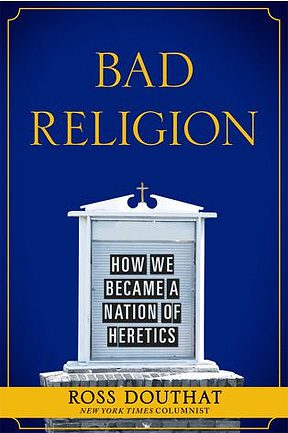Are we a nation of heretics? Ross Douthat, a columnist for the New York Times, says “Yes.” It’s a rather elaborate “Yes,” actually, taking up 293 pages of Douthat’s new book, Bad Religion: How We Became a Nation of Heretics.
 I always enjoy Douthat’s writing, and Bad Religion is no exception to this rule. He is thoughtful, knowledgeable, and can turn a phrase with the best of them. I’m about a quarter into Bad Religion and am finding myself both informed and entertained. So far, Douthat has been focusing on the rise and fall of mainline Christianity in America in the last half century or a little more.
I always enjoy Douthat’s writing, and Bad Religion is no exception to this rule. He is thoughtful, knowledgeable, and can turn a phrase with the best of them. I’m about a quarter into Bad Religion and am finding myself both informed and entertained. So far, Douthat has been focusing on the rise and fall of mainline Christianity in America in the last half century or a little more.
If you’re looking for a way to sample Douthat’s thinking before you purchase Bad Religion, Christianity Today has a fine interview available online.
Here’s how it begins:
The biggest threat facing America is not a faltering economy or a spate of books by famed atheists. Rather, the country meets new challenges due to the decline of traditional Christianity, New York Times columnist Ross Douthat suggests in Bad Religion: How We Became a Nation of Heretics (Free Press). Douthat has taken his own personal tour of American Christianity: he was baptized Episcopalian, attended evangelical and Pentecostal churches as a child, and converted to Catholicism at age 17. He argues that prosperity preachers, self-esteem gurus, and politics operating as religion contribute to the contemporary decline of America. CT spoke with Douthat about America’s decline from a vigorous faith, modern heretics, and why we need a revival of traditional Christianity.
What do you mean when you say we’re facing the threat of heresy?
I try to use an ecumenical definition, starting with what I see as the theological common ground shared by my own Catholic Church and many Protestant denominations. Then I look at forms of American religion that are influenced by Christianity, but depart in some significant way from this consensus. It’s a C. S. Lewisian, Mere Christianity definition of orthodoxy or heresy. I’m trying to look at the ways the American religion today departs from theological and moral premises that traditional Protestants and Catholics have in common.
How did America become a nation of heretics?
We’ve always been a nation of heretics. Heresy used to be constrained and balanced by institutional Christianity to a far greater extent than it is today. What’s unique about our religious moment is not the movements and currents such as the “lost gospel” industry, the world of prosperity preaching, the kind of therapeutic religion that you get from someone like Oprah Winfrey, or various highly politicized forms of faith. What’s new is the weakness of the orthodox Christian response. There were prosperity preachers and therapeutic religion in the 1940s and ’50s—think of bestsellers like Norman Vincent Peale’s The Power of Positive Thinking—but there was also a much more robust Christian center.
The Protestant and Catholic churches that made a real effort to root their doctrine and practice in historic Christianity were vastly stronger than they are today. Even someone who was dabbling in what I call heresy was also more likely to have something in his religious life—some institutional or confessional pressure—tugging him back toward a more traditional faith. The influence of heretics has been magnified by the decline of orthodox Christianity.
Of course, Douthat won’t win any popularity contest by using the words “heresy” and “heretics” to describe people in our day who think they are Christian or, at any rate, acceptably spiritual. He’s got enough here to make just about everybody upset. Mainliners will object to his blunt depiction of denominational decline. Freethinking Christians and other religious folk will be put off by being labeled heretics. And atheists will be bugged by the fact that a book on “bad religion” turns out to believe that certain kinds of religion, especially orthodox (right-thinking) religion, is in fact good.
Whether you agree with Douthat’s basic thesis or not, I think he’s on to something. I’ll have more to say about this later.











